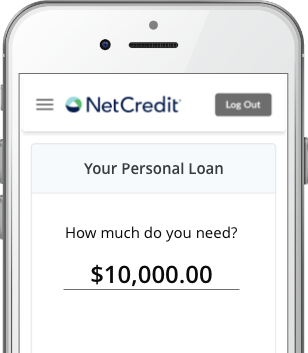Get a fast, flexible loan up to $10,000.
This won't affect your credit score.
Auto repair loans, also referred to as auto repair financing, are meant to cover sudden expenses like replacing broken parts or fixing accident damage. NetCredit fast funding can help ease the cost of car and vehicle repairs — so you can get back on the road in no time.
Check your eligibility with no paperwork in just a matter of minutes. You’ll get an instant eligibility decision — and if you’re approved, you can have your car repaired as soon as possible.
You’re more than a number in a database, and you deserve a loan designed for you. When you apply, advanced algorithms take a broader look at your finances to create an offer just for you.
If approved, you can borrow an amount that meets your needs and repay in a way that works best for your financial situation, making it simple to take care of your auto repairs.

Choose what you want and see if the available amounts and terms work for you.

If approved, requested funds are typically deposited the next business day or sooner.
NetCredit and lending partner banks offer personal loans up to $10,000 and lines of credit up to $4,500.
Depending on your application and the state where you live, you might qualify for one or both of our lending products. Head to the Rates & Terms for more details and to learn what is offered in your state.

Devin needs his car to get to work every day, and neither his insurance nor his warranty will cover the high cost of repairing his vehicle.
He comes to NetCredit and sees that he can quickly apply for a personal loan or line of credit to pay for auto repairs — without having to provide his car title as collateral.
He completes the application in minutes, is approved, signs his contract and promptly provides a few requested documents to ensure fast funding.
Because Devin submitted his application before 11:00 a.m. CT and was approved before 12:00 p.m. CT on a weekday, he received fast funding and had his car repaired later that day!
Devin makes all of his repayments on time. His on-time payments are reported to major credit bureaus, helping Devin build credit history.
Car repair loans are often personal loans and may be either secured or unsecured, depending on the lender. If it is unsecured, the loan typically requires a credit check. If the car repair loan is secured financing, the automobile's title is often used as the collateral for the loan. In this case, the loan amount is limited to a portion of the current market or blue book value of the vehicle. This form of auto repair financing is usually called a title pawn loan or pink slip financing.
NetCredit personal loans and lines of credit provide alternatives for people who have difficulty getting approved for traditional bank loans or other forms of credit. This makes it possible for someone with less-than-perfect credit to qualify for car repair financing. Plus, NetCredit lending products are unsecured, which means you are not required to provide collateral such as a home or car title.
Depending on the type of repair that is needed, you should consider purchasing a new or lightly used car in lieu of fixing the current car or truck. There are a number of factors you should consider in this situation, including:
How much is your current vehicle worth?
How much would it cost to purchase a new/used vehicle?
What is the overall cost of the repairs?
When considering repairs that are approximately equal to or more than the value of your current vehicle, it may make more financial sense to buy a vehicle as opposed to getting your current one repaired.
Many programs help to alleviate surprise expenses from vehicle repairs and eliminate the need for auto repair loans:
New Car Warranties: Most new cars are covered by manufacturer and dealer warranties for mechanical failures and recall fixes.
Extended and Used Car Warranties: Extended warranty programs provide limited coverage for certain repairs for used vehicles. These warranty programs can extend an existing warranty or may be new warranties for older vehicles.
Collision Insurance: Collision coverage is optional for most vehicle insurance plans, but it can be valuable. Collision insurance covers the cost, after deductibles, of repairing your car, as long as the damage was caused by an accident.
Without these programs, car owners may need to turn to a lender or creditor in order to borrow the money needed to get their vehicle up and running.
This won't affect your credit score.